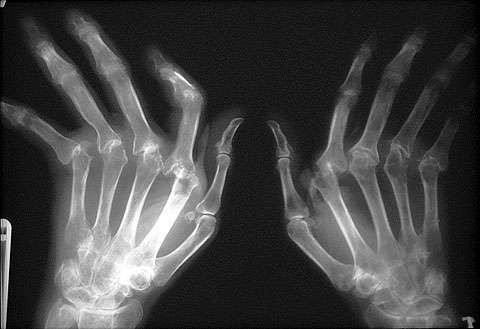Taking the pill lowers women's risk of getting arthritis
Taking the pill for more than 7 years cuts women's arthritis risk by almost 20%.

Taking the pill could significantly reduce women's chances of developing rheumatoid arthritis, a large study in Sweden has found.
Rheumatoid arthritis is a chronic autoimmune condition that causes pain and swelling in the joints, which typically develops between the ages of 35 and 55. It's more common in women than in men by a ratio of about 3 to 1.
The combined oral contraceptive pill releases two female sex hormones, oestrogen and progestogen, in the body. One of the effects of these elevated hormone levels is to prevent women from becoming pregnant. But they have many other complex effects on the female body that are only just coming to light, more than 50 years after women first started taking it.
The pill has been linked to mental health conditions such as depression, and it has a complex relationship with cancer, increasing the risk of cervical and breast cancers while decreasing the risk of ovarian and uterus cancers. A large study of women in Sweden has now found that taking it for more than seven years gives women a significantly reduced risk of developing rheumatoid arthritis.
A total of 2,578 women with arthritis and 4,129 women without answered questions about their contraceptive history and had blood samples to test for a marker for arthritis called ACPA.
Among women who were taking the pill at the time of the study there was a 15% reduced risk of arthritis compared with those not taking the pill. For people who had taken the pill the past, there was an average reduced risk of 13%. Most strikingly, for women who had taken the pill for 7 years or more, there was a 19% reduction in risk.
Exactly what it is about the pill that gives this protective effect is not yet clear.
"Hormonal system is so complex. There might be a lot of aspects of the pill that are involved in different ways," study author Camilla Bengtsson, Institute of Environmental Medicine, Karolinska Institute in Sweden told IBTimes UK.
"For the use of oral contraceptive, there is not really a hypothesis yet. Clinical trials could help to understand this."

The study controlled for factors linked to rheumatoid arthritis, including smoking, alcohol, BMI and socioeconomic status. This, coupled with the large size number of women taking part, leant the study its strength, said David Isenberg, Arthritis Research UK professor of rheumatology at University College London, who was not involved in the research.
"We know that arthritis is never due to a single factor, it's always a complex mix of environmental and genetic factors. This paper is telling us that oral contraception gives women a decreased risk of arthritis," Isenberg said.
This could influence women's decisions of the type of contraception they use, he said. If a woman has three sisters and two of them have arthritis, she might be tempted to consider using the pill instead of or as well as other contraceptive methods, such as condoms.
But this should be borne in mind alongside the other known side effects of the pill, Isenberg added.
"You have to weigh up the factors, and see which one would be the more important to you. Fundamentally, the balance of decision-making is something to discuss with your GP or rheumatologist."
© Copyright IBTimes 2025. All rights reserved.






















